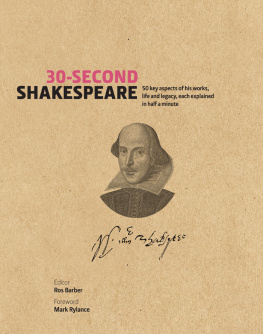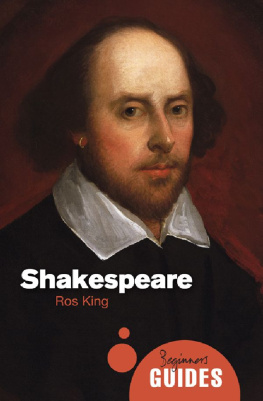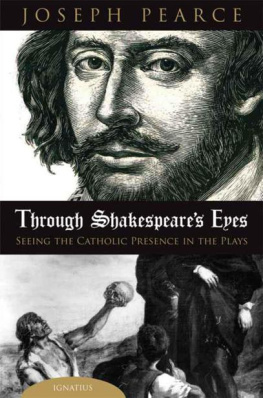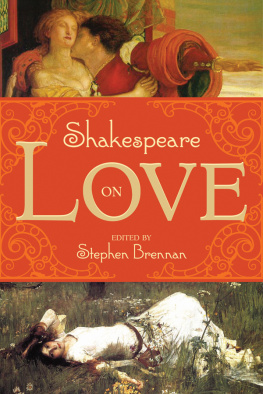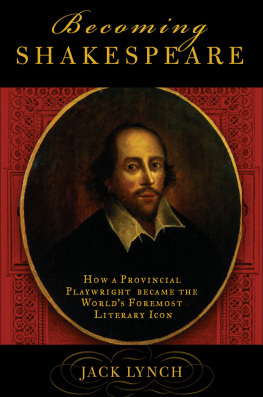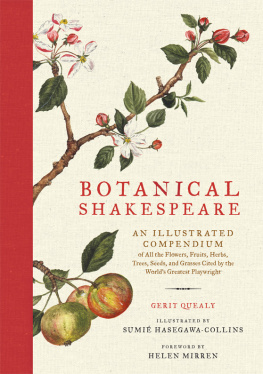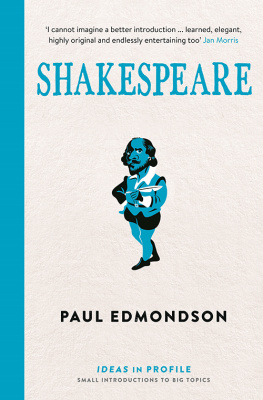30-SECOND
SHAKESPEARE
50 key aspects of his works, life and legacy, each explained in half a minute
Editor
Ros Barber
Foreword
Mark Rylance
Contributors
Ros Barber
Jessica Dyson
Andrew James Hartley
Margrethe Jolly
Claire van Kampen
Kirk Melnikoff
Lynn Robson
Lee Joseph Rooney
Earl Showerman
Robin Williams
Illustrations
Ivan Hissey

Weve all heard of Shakespeare but what has made him endure beyond any other writer? Do you know enough about the worlds most famous playwright to join a dinner party debate on the life, works and legacy of the Bard?
30-Second Shakespeare features 50 of the key moments, works and lasting influences of the Bard, all explained clearly and without the clutter. Each entry is summarized in just 30 seconds using nothing more than two pages, 300 words and one picture. Leading Shakespeare scholars present an expert guide to his life and works, from the intrigue of the authorship question to the meanings of key concepts, themes and motifs, and his extraordinary enduring literary and linguistic legacy. Illustrated with engaging graphics and including features on seven key plays, 30-Second Shakespeare offers the quickest way into the mind of a literary giant.
First published in Great Britain in 2015 by
Ivy Press
210 High Street, Lewes,
East Sussex BN7 2NS, U.K.
www.ivypress.co.uk
Copyright The Ivy Press Limited 2015
All rights reserved. No part of this publication may be reproduced or transmitted in any form by any means, electronic or mechanical, including photocopying, recording, or by any information storage-and-retrieval system, without written permission from the copyright holder.
British Library Cataloguing-in-Publication Data
A CIP catalogue record for this book is available from the British Library.
ISBN: 978-1-78240-260-2
EPUB ISBN: 978-1-78240-292-3
MOBI ISBN: 978-1-78240-293-0
PDF ISBN: 978-1-78240-294-7
This book was conceived, designed and produced by
Ivy Press
210 High Street, Lewes,
East Sussex BN7 2NS, U.K.
www.ivypress.co.uk
Creative Director Peter Bridgewater
Publisher Susan Kelly
Editorial Director Tom Kitch
Art Director Michael Whitehead
Senior Project Editor Caroline Earle
Commissioning Editor Jacqui Sayers
Designer Ginny Zeal
Illustrator Ivan Hissey
Picture Researcher Katie Greenwood
Glossaries Text Ros Barber
Typeset in Section
Colour origination by
Ivy Press Reprographics
Distributed worldwide (except North America) by Thames & Hudson Ltd., 181A High Holborn, London WC1V 7QX, United Kingdom
CONTENTS
FOREWORD
Mark Rylance
Thirty seconds? Speaking Shakespeare in 30 seconds I only get to Aye theres the rub in the To be or not to be soliloquy. But I am notoriously slow. To leave or not to leave. Get a bloody move on, was a message I received backstage when I played Hamlet. I once heard two actors battle it out on the Globe stage to determine who could speak To be or not to be the fastest. Mr Colin Hurley established himself that evening as the fastest Hamlet in history. I just texted him. I think it was about 32 seconds, he texts back, any faster than that and you lose some of the poetry.
The appreciation of speed is nothing new. Hermogenes (Greek Philosopher, 2nd century CE ) praised Speed as one of the seven essential qualities of the perfect orator. Speed makes a speech seem lively and mobile, he wrote. I agree. Appropriate speed. Clarity, Grandeur, Beauty, Ethos, Verity and Decorum were the other essential ingredients of an eloquent speaker. Eloquence is defined in The Oxford English Dictionary as the action, practice or art of expressing thought with fluency, force and appropriateness so as to appeal to reason or move the feelings.
So what is the appropriate speed for enjoying Shakespeare? Thirty seconds? Fine with me. In 30 seconds I can say Hang there like fruit, my soul, till the tree die. I could say it again and still have time to say We are such stuff as dreams are made on, or time hath my lord a wallet at his back. Thats enough for my reason and feelings for some time. And so, in the words of the character Speed (Two Gentlemen of Verona), Ill commend you, 30-second Shakespeare book, to my master, William Shakespeare, and wish you good speed throughout the world.

INTRODUCTION
Ros Barber

More books have been written about Shakespeare than about any other writer or creative person. So what particular use is this one? The wide-ranging nature of the subject, compressed into a condensed format, might make it very useful indeed. We may come across Shakespeare at school, we may even study or see a play or two, but most of us are unlikely to go much further. After 400 years, Elizabethan English is more or less a foreign language and one to which few of us can naturally relate. Yet we also become aware that Shakespeare is everywhere in our culture; he and his works are constantly name-checked, and if we dont get the references, we are missing out. This book aims to make Shakespeare interesting and comprehensible by cutting out the waffle and boiling the subject down to its essence in order to explain what makes Shakespeares poems and plays so uniquely important, interesting and durable.
The man-shaped hole
Most general-purpose books about Shakespeare focus on the man; most academic books focus on the works. But the man or rather the historical record connected to the man is so unsatisfactory that some people question whether he wrote the works at all. Bill Bryson described Shakespeare as the literary equivalent of an electron forever there and not there, and historian Michael Wood described Shakespeares biography as a man-shaped hole. Shakespeare biographies are obliged to recycle the same unsatisfactory material, padding it out with conjecture and assumption. This general-purpose book, written by scholars, does away with conjecture, focusing instead on the central body of work that made Shakespeare a household name.

The Globe
Originally built in 1599, many of Shakespeares plays were first performed at the Globe. The theatre was rebuilt in the 1990s, such is the Bards enduring appeal.
The humanity-shaped whole
For what matters about Shakespeare is not the man, but the humanity found in his works. The whispered intimacy of his sonnets. The psychological insights of his plays. Tragedies that grab you by the collar, pull you into the darkness and stab you in the belly. Comedies that undress you and stand you in front of a full-length mirror to laugh at yourself. Histories carved into the flesh of your past by men who Shakespeare shows us were fully human, whether they were a tavern-keeper or a king. Though now touted as a god, Shakespeare was fully human. He understood the human condition better than most and expressed it better than any, in compressed and poetic truths that we have quoted so often theyre now part of our language. What has made Shakespeare endure beyond any other writer is his gift for concisely revealing us to ourselves.
Next page
